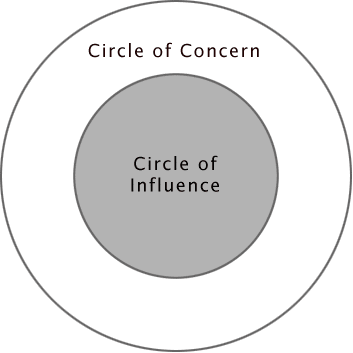There might be affiliate links on this page, which means we get a small commission of anything you buy. As an Amazon Associate we earn from qualifying purchases. Please do your own research before making any online purchase.
Let’s talk about the things we all worry about.
According to Psychological Health Care, the top three worries in our lives are:
Elite Daily came up with a similar top three, ending up with:
Whatever your main concerns are in life, think for a second about the amount of control you have over each of those domains.
For example, I think a very real concern that everyone is sharing right now is contracting the COVID-19 virus or having a loved one become infected.
What kind of control do you have over this concern? You can definitely reduce your risk of catching the virus by following the recommendations of social distancing and washing your hands. These actions that you choose to take allow you to have a sense of control over becoming diagnosed with COVID-19.
However, you can’t control the worldwide pandemic that is occuring. You personally can’t make it stop or slow it down aside from doing your part in not spreading it yourself. Your actions in response to the threat of this virus are in your Circle of Influence, however, the virus itself is not.
In this article, we are going to talk about your Circle of Influence and how you can use this concept to rank your priorities and take ownership over your actions.
Let’s look at a quick definition of the Circle of Influence, and then go deeper into its origin before really breaking this concept down.
Circle of Influence: A Definition
A Circle of Influence contains the concerns in your life that you can do something about.
For example, let’s say you’re worried about finances. You have control over how much of your paycheck you put into savings every month. You also have control over the things you buy. So these things would be in your personal Circle of Influence.
You will understand the significance of this more after we look at its origin.
Where Did the Circle of Influence Originate?
In Stephen Covey’s book, The 7 Habits of Highly Effective People, he lists the first habit as being proactive.
The prefix “pro-” in this word means “before”, which suggests a meaning of acting before an event. On the contrary, “re-” in reactive means “after”, suggesting the opposite.
Taking a proactive approach means you’re aiming to prevent problems before they arise, while a reactive approach leads one to respond to events after they’ve already happened.
Being proactive is about taking personal responsibility for every action and decision that you make, often because you have a forward-facing approach, allowing you to act on your own educated predictions of future events.
Proactive people know that they have the power to choose their response to any issue, and they don’t blame their life’s circumstances on other people, events, or anything else aside from the decisions that they’ve made on their own.
Alternatively, reactive people allow themselves to be affected by their environment. They can identify pre-existing events or sources that may influence their actions and therefore determine their outcomes.
Their performance isn’t determined by their own attitude and abilities–rather, it is dictated by others.
The principal difference between being proactive and being reactive is your perspective regarding which you allow to come first–events or your actions. Let’s look at an example:
Reactive: “The program failed because I didn’t get enough support from the other people on my team. They have to do better next time.”
Proactive: “My program failed because I didn’t communicate my needs effectively to my team. Next time, I will create a more effective presentation for my team explaining each person’s role in the success of this program.”
As you can see in the proactive statement, this person is taking personal responsibility for the lack of success of their program and making plans for the future about how to prevent the situation from happening again.
Read this post on a more in-depth discussion of reactive vs proactive.
What is a Circle of Influence?
The Circle of Influence, which is also thoroughly explained in this video, originated in Dr. Covey’s explanation of what he believes is the first habit of successful people, which is being proactive.
Dr. Covey presents the idea of having a Circle of Concern, which includes any issues in life that worry you.
While the things that lie in this Circle may be unique for everyone, the one thing that everyone’s circle has in common is the embedded Circle of Influence, which only includes concerns that you have some sort of control over–or you can actively do something about.
Proactive people focus their time and energy on their Circle of Influence because they know that these efforts have the potential to make a positive impact on future events.
If you do this, your Circle of Influence will begin to grow because other people will notice that your efforts have a positive impact, which will give you leverage and a sense of authority.
Alternatively, if you spend your energy focusing on things in your Circle of Concern that are outside of your Circle of Influence, you’re wasting time and energy reacting to issues that already exist and cannot be changed.
By focusing on issues that you can’t change, you will inevitably adopt a “victim” mindset and feel (and appear to others to be) powerless. Consequently, your Circle of Influence will shrink.

Knowing how large your Circle of Influence is within your Circle of Concern is an important factor in your ability to be successful. And, the larger your Circle of Influence is, the more successful you will be, which comes along with being respected as a leader and having other people support your endeavors.
However, your influence will not expand if you stay in the same routine and keep the same bad habits that you’ve always had, or stay around the same people whom you’ve always kept for company.
Rather, you have to be intentional about building your Circle of Influence. Let’s take a look at some ways you can expand this significant Circle.
7 Ways to Expand Your Circle of Influence
1. Choose Your Words Wisely
One of the most influential tools that you have is your voice. Your language is a strong indication of whether you’re pro- or reactive.
Proactive people use words such as “I can” and “I will”, while reactive people often say, “I can’t” or “if only”. Here are some examples:
Reactive Language
Proactive Language
Part of being proactive is also about asking yourself the right questions to help form a plan of action. For example:
Be mindful of how you talk to other people and of your internal dialogue. Your attitude can be greatly influenced by the words that you choose.
2. Stay Consistent and Reliable
Your level of consistency will either increase or decrease your influence. People who are consistent and reliable are more easily trusted by others because they always follow through with their promises and plans.
If you’re consistent and reliable, you will be among the first people that others trust with new ideas, collaborations, projects, and responsibilities.
People who are in leadership roles will want to work with you because they will know that they can count on you to do what you say that you’ll do.
3. Be Empathetic
Being able to recognize the emotions of other people by taking the time to relate their situation to your own experiences will help you develop relationships.
You become a more caring person who has the emotional intelligence to be accepting of the people around you if you’re in tune with their emotions and attitudes.
When you’re able to relate to people, they will trust you more with their feelings, putting you in a better position to influence them. Also, if you take the time to care about other people, they will do the same for you.
Note: Influencing people is not the same as manipulating people. While they are closely linked in the sense that both involve exerting some kind of control over someone else’s actions, influencing someone doesn’t come with malicious intent.

According to Social-Engineer, manipulation is defined as “exerting devious influence over a person for your own advantage”, while influencing is “the process of getting someone else to want to do, react, think, or believe the way you want them to.”
When you manipulate someone, you leave them feeling poorly or negative in some way. In doing so, you largely decrease the chances that this person will want to work with you again in the future or do anything to help you make progress toward your goals.
On the other hand, when you influence someone, you preserve the relationship with them.
4. Think Outside the Box
You want to be looking for solutions that other people haven’t yet considered to issues that you’re facing. If you want to expand your influence, you need to be the one who finds the solution to a current problem.
When you’re associated with solutions, people will start calling you to consult with you and use your help to resolve problems they’re facing.
5. Accept Responsibility
Accepting responsibility for your successes and your failures is another way that you’re going to build trust within your community.
Furthermore, giving credit when it’s due or acknowledging others when things go as planned (for example, acknowledging the people you manage at work if your team completes a successful project) lets you expand your influence, as others will recognize your integrity in endorsing anyone else who has helped you succeed.
By recognizing other people’s work as being good examples of the type of work that meets your standards and expectations, you’re reinforcing what works and what’s been done well. When one person feels valued and appreciated, others will want to feel that as well.
6. Have a Purpose
Why do you want to have influence over anything? What are you seeking to gain or achieve?
Making efforts to expand your influence without having a clear goal will leave you (and those whom you want to influence) directionless. With a clear purpose in place, you can put your prestige to appropriate use, which will strengthen others’ support for you.
You also want to have a healthy sense of enthusiasm about your purpose. When it’s evident to others, your passion about your goals will be contagious, leading others to grow that same sense of excitement for the work you’re doing.
Enthusiastic people attract enthusiastic people. They stay surrounded by passionate people who will naturally expand their influence.
Watch the video below to learn about the two options for finding your purpose in life according to Shawn Achor, author of The Happiness Advantage.
7. Stay Focused
As you expand your Circle of Influence, you have to be increasingly intentional about the information you pay attention to–whether it’s things you’re hearing or reading about on the news or it’s someone else’s advice (solicited or unsolicited).
Screen your sources, as not every piece of information you come across will be helpful or sent with good intentions.
Part of staying focused is educating yourself from reliable sources if you feel like you need to learn more about a topic. The wealth of information that’s out there can be equally as helpful for you as it is a drawback.
Read relevant information and attend any significant training sessions that you come across that will help you further develop your experience, and thus further develop your influence. Continually work on fine-tuning your skills.
Finally, stay focused by picking your battles. Even if you’re facing several obstacles that are within your power to fix, focus only on those that serve a direct purpose to your end goal. Don’t try to take on too much at once because nothing will get done well.
Final Thoughts on Expanding Your Circle of Influence
By following these tips, you will become increasingly influential, as the credibility that you will gain from demonstrating these positive behaviors is undeniable.
Once you’ve expanded your Circle of Influence, what are you going to do with the power you’ve acquired? Keep in mind how quickly you can lose your influence once you’ve attained it, so maintaining your integrity for the long-term is key.
If you want to expand your Circle of Influence, make sure that your intentions, communication, values, and behaviors are all in line with each other.
People allow themselves to be influenced by those whom they respect and trust, so the more sincere you can be, the more your circle will grow.
If you want to learn more, then be sure to read these articles:.
- How to Use Your Circle of Control to Stop Worrying About Life
- The Hawthorne Effect: 5 Examples to Positively Impact Your Life
- 33 Growth Mindset Examples to Change Your Beliefs
Finally, if you want to take your goal-setting efforts to the next level, check out this FREE printable worksheet and a step-by-step process that will help you set effective SMART goals.

Connie Mathers is a professional editor and freelance writer. She holds a Bachelor's Degree in Marketing and a Master’s Degree in Social Work. When she is not writing, Connie is either spending time with her daughter and two dogs, running, or working at her full-time job as a social worker in Richmond, VA.


